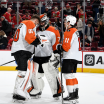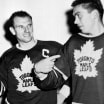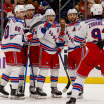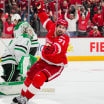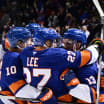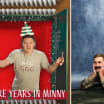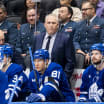Zubov was quietly effective throughout career on way to Hall of Fame
Class of 2019 member 'lot better than people thought,' won Stanley Cup with Rangers, Stars
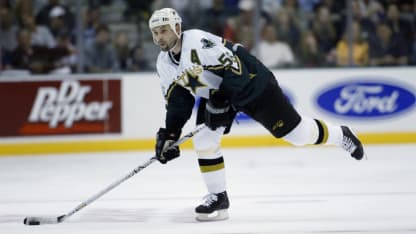
© Ronald Martinez/Getty Images
"I think I'm going to start it with introducing myself to the NHL media," Zubov said.
One of the NHL's most productive offensive defensemen during his 16 seasons with the New York Rangers, Pittsburgh Penguins and Dallas Stars, Zubov preferred playing to talking to reporters.
"Honestly, I wasn't a big fan of it," he said. "Still not."
Zubov laughed when he said that, acknowledging the spotlight he avoided for so long will be on him when he, former Stars teammate Guy Carbonneau, Vaclav Nedomansky, Hayley Wickenheiser, Jim Rutherford and Jerry York are inducted into the Hall of Fame on Monday. It's a commendation that Zubov, who retired in 2010 after playing one season for St. Petersburg SKA in the Kontinental Hockey League, never expected.
"It's a totally different feeling," Zubov said. "It's something you're definitely going to remember for the rest of your life. It's amazing. I'm honored, but surprised. I thought I would never make it."
There's no question Zubov, who has been eligible to be voted into the Hall of Fame since 2013, has the credentials.
A two-time Stanley Cup winner, the 49-year-old is 20th among defensemen in NHL history with 771 points (152 goals, 619 assists) in 1,068 regular season games and second among Russia-born defensemen behind Sergei Gonchar, who had 811 points. Zubov's 619 assists are most among Russia-born defensemen.
Zubov's point play was pivotal to power plays that were ranked first in the NHL with the Rangers in 1993-94 (23 percent), the Penguins in 1995-96 (25.9 percent) and the Stars in 1997-98 (20 percent).
The NHL crew talks about Sergei Zubov's HOF induction
From 1993-94 through 2006-07, Zubov was fifth in the NHL with 377 power-play points, (76 goals, 301 assists), behind Jaromir Jagr (453), Joe Sakic (428) Nicklas Lidstrom (396) and Teemu Selanne (395). His 301 power-play assists were third in the NHL over that span behind Doug Weight's 305 and Lidstrom's 303.
Mike Modano, a 2014 Hall of Fame inductee and Zubov's former Stars teammate, said Zubov's ability to see the entire ice and all the options around him made him special.
"He never had to look down and see where the puck was before he made a pass," Modano said. "You look at players now and the fundamental of just carrying the puck with your head up is a bit of a lost art, but he was one of the best at it."
Former Rangers teammate Brian Leetch points to his goal in Game 7 of the 1994 Stanley Cup Final against the Vancouver Canucks, which opened the scoring, as an example of this. After taking a drop pass from Mark Messier on the rush, Zubov moved into the right circle with his head up, looking as if the was going to shoot and causing goalie Kirk McLean to commit in that direction.
When Zubov passed across to Leetch in the bottom of the left circle, Leetch had an empty net to shoot into.
"If I didn't know him and wasn't comfortable with the way he plays, I would've bailed if I saw the other D with the puck coming down to create an offensive chance with no one in behind him," said Leetch, a 2009 Hall of Fame inductee. "But because it's him and because of the way we were playing together, I stayed and he put it right on my tape and I had an empty net."
The Rangers won 3-2 to win the Stanley Cup for the first time since 1940. Zubov and Rangers teammates Alexei Kovalev, Sergei Nemchinov and Alexander Karpovtsev were the first Russia-born players to get their names on the Cup.
Growing up in Moscow, Zubov never dreamed of winning the Cup. The dissolution of the Soviet Union in the late 1980s made possible things that went beyond his imagination.
"We got lucky, my generation and some of the older guys who had a chance," Zubov said. "We got caught in the middle when the big country started falling apart. The Soviet Union's days were gone, and we were fortunate that we had a chance to play in the best league in the world."
Zubov played for the powerful CSKA Moscow team that included a host of future NHL players, including Hockey Hall of Famers Sergei Fedorov and Pavel Bure. Zubov was also overshadowed on the Soviet Union's gold medal-winning team at the 1989 IIHF World Junior Championship in Anchorage, Alaska by Fedorov, Bure and Alexander Mogilny.
Neil Smith, the Rangers general manager from 1989-2000, was director of amateur scouting with the Detroit Red Wings when they selected Fedorov in the fourth round (No. 74) of the 1989 NHL Draft and was well aware of the talent in the Soviet Union.
The Rangers selected Zubov in the fifth round (No. 85) of the 1990 draft, Smith's first as their GM.
"You could see that his intelligence for the game was always what made him very, very special," Smith said. "When I say very, very special, we took him in the fifth round."
After helping the Unified Team win the gold medal at the 1992 Albertville Olympics, Zubov came to North America and split the 1992-93 season between Binghamton in the American Hockey League and New York. In 1993-94, the Rangers went 52-24-8 to win the Presidents' Trophy and Zubov led them with 89 points (12 goals, 77 assists) in 78 regular-season games.
Zubov was second in the NHL in points among defensemen that season behind Ray Bourque of the Boston Bruins, who had 91, and his 77 assists were most by a defenseman and fourth overall in the League. In the Stanley Cup Playoffs, Zubov was fourth on the Rangers with 19 points (five goals, 14 assists) in 22 games to help them end their 54-year championship drought.
"It was like a quick dream that you couldn't imagine," Zubov said. "It was fun playing with the guys back then on our team and it was just an incredible experience. But I would say my feelings were like, 'Wow, that's pretty cool. If this is the way, I'll take it any day.' Then, you realize how hard it is later on."
Zubov learned that over the following five seasons before he won the Cup again with the Stars in 1999.
The Rangers wanted a more physical presence on their defense and to strengthen their scoring depth at forward after being swept by the Philadelphia Flyers in the 1995 Eastern Conference Semifinals. So, they traded Zubov and forward Petr Nedved to the Penguins for defenseman Ulf Samuelsson and forward Luc Robitaille on Aug. 31, 1995.
Less than a year later, Pittsburgh also wanted to upgrade physically on defense and traded Zubov to Dallas for Kevin Hatcher on June 22, 1996.
Zubov wasn't happy about the trade initially. The Stars were 26-44-14 and finished last in the Central Division in 1995-96, and Zubov knew nothing about hockey's growing popularity in Dallas.
"Who had heard of hockey in Texas?" said Zubov, who will have his No. 56 retired by the Stars next season. "I told my agent, 'I'm not going there. Just get me traded.' But then things worked out."
Ken Hitchcock, who took over as Stars coach midway through the 1995-96 season, said it was a "group activity" that included GM Bob Gainey and the coaching staff to convince Zubov to stay.
"But we were nervous," Hitchcock said. "He came and he played exhibition games and I told (assistant) Rick Wilson, 'I don't care what you do. Don't let him come off the ice. If you've got to play him 40 minutes, play him 40 minutes.'
"And what triggered everything is Rick had him kill penalties in exhibition games. He got so excited by doing that, he stayed."
The Stars went 48-26-8 in 1996-97 to finish first in the Central Division with 104 points, the first of seven division titles they won during Zubov's 12 seasons with them.
Modano on Carbonneau, Zubov getting Hall of Fame call
After getting 43 points (13 goals, 30 assists) in 1996-97, Zubov tied with the Mighty Ducks of Anaheim's Scott Niedermayer for second in the NHL among defensemen in 1997-98 with 57 points (10 goals, 47 assists), behind Detroit's Lidstrom with 59. Zubov had 51 points (10 goals, 41 assists) in 1998-99 when Dallas won the Presidents' Trophy by going 51-19-12.
Zubov had 13 points (one goal, 12 assists) in 23 playoff games when the Stars won the Cup in 1999. Having been with Dallas through each step of the journey, Zubov appreciated the accomplishment more.
"It was way more challenging," he said. "Our team was building up for a longer time and it took time for us to come together and get all the right pieces together."
Perhaps because of the numbers Zubov put up offensively, he rarely got credit for his defensive play. But the Stars trusted him to play on the penalty kill and he often logged heavy minutes.
Zubov led Dallas, averaging 30:16 in ice time in the playoffs during its 1999 Cup run.
"A guy like Zubov in today's game would be unbelievable with the speed of the game and the way plays are made," Carbonneau said. "But he was really known for his offense as a playmaker, and he was underrated defensively.
"He was a lot better than people thought."
That might be why Zubov never won the Norris Trophy, voted annually as the top defenseman in the NHL. He was a finalist once, when he finished third behind Lidstrom and Niedermayer in 2005-06.
The only other time he finished higher than eighth in the Norris voting was in 1993-94 when he was fourth behind Bourque, Scott Stevens and Al MacInnis.
"You had Nick Lidstrom and some other guys that were so consistent and so good," Leetch said. "But what's fun is being in New York even after retiring and you have players that come through who have played with Zubie and his name comes up referencing the ice in the veins and slowing the game down and looking guys off. They're like, 'I've never seen anything like it.' I'd go, 'I agree 100 percent. I was lucky enough to be with him in some of our best times and everything you're saying I completely agree with.'"
Zubov attributes his lack of Norris attention to being stuck behind Lidstrom, a seven-time Norris winner he calls, "the perfect human."
"He was, honestly, the guy that in every aspect of the game was ahead of everybody," Zubov said.
Finally receiving some recognition by being voted into the Hall of Fame has been gratifying for Zubov and led him to reflect on some of his best moments while preparing his induction speech.
"There's many memories, winning the Stanley Cups and winning the Olympics," Zubov said. "The older you get, it seems good to have memories."




